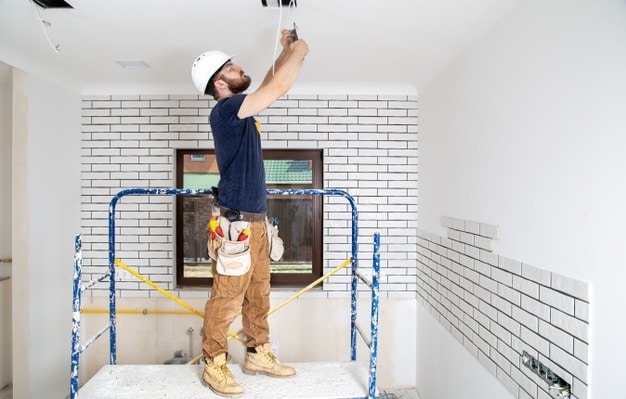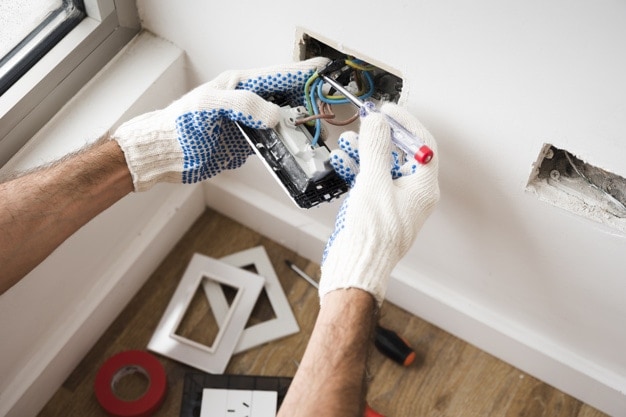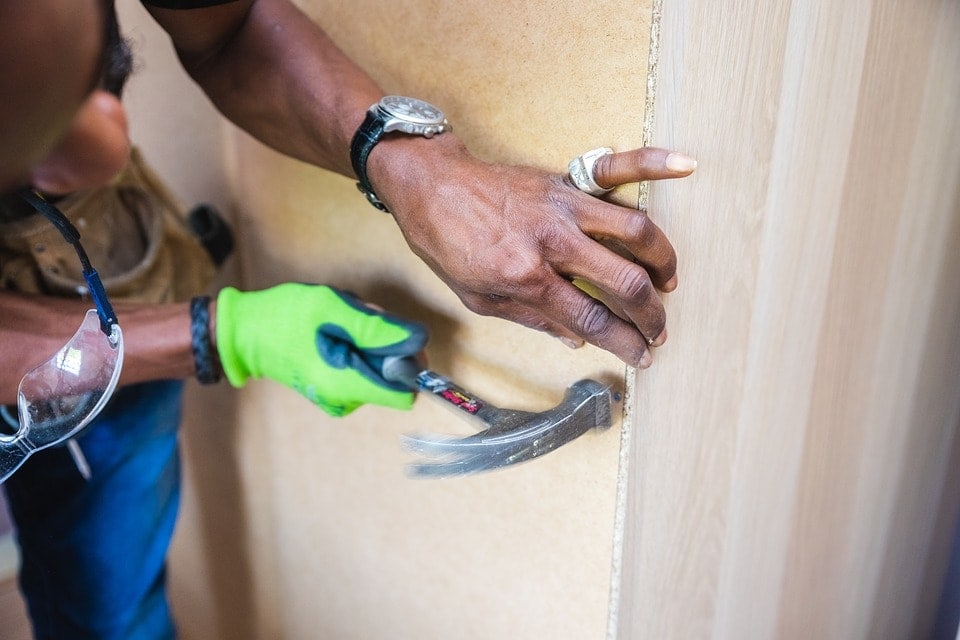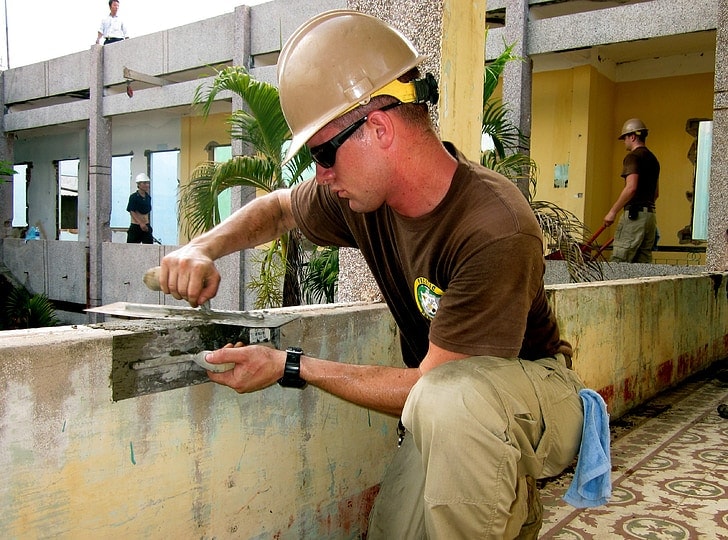When to Do-It-Yourself and When to Hire? What to Ask Yourself
-
Pete Ortiz
- Last updated:

DIY projects can be extremely rewarding. Especially if it is a project that turns out just right, you feel nothing but pride every time you walk past that area of the home. Not to mention, doing DIY projects on your own is a fun pastime.
At the same time, taking on a do-it-yourself project when you don’t have the skill, time, or resources can be an absolute nightmare and money drainer. Because of this fact, it is imperative to know when you should do it yourself and when you should hire.
If you can’t tell whether or not you should leave a job up to professionals, you should likely hire a professional. Still, you should consider doing it yourself since it might save you money. In this article, we’re going to go over some key questions to ask yourself and give examples of DIY jobs and hire jobs to help you determine whether or not you are fit to do the job yourself.
Questions to Ask Yourself
If you are completely dumbfounded as to whether or not you should do a project by yourself, you should start by asking yourself a few questions. These questions will help you evaluate if you have the time, skill, and resources to do the project yourself, or if you should simply hire someone else to do the job for you.
1. Can you perform the job safely?
The first thing you should ask yourself is whether or not you can perform the job safely. Regardless of whether or not you have the skill, time, or money to perform a DIY project, you absolutely must hire a professional if you do not have the needed tools or accessories to perform the job safely.
Obviously, your experience and skill level will dramatically affect whether or not you can safely renovate your home. However, you could also be lacking working partners, goggles, or the appropriate tools to make the job safe, even if you have the skills.
One of the easiest ways to tell if a job will be unsafe is to consider the potential consequences if you were to mess up. For example, messing up during a paint job will not put your health at risk. Installing a new light fixture, however, could seriously injure you if you do it incorrectly. Assessing the potential damage to your health in worst-case scenarios can really help you learn whether or not the job is safe.
Additionally, there are some other signs that the job you are considering is seriously dangerous. Here are three safety signs that you should hire a professional:
- It could lead to death if you mess up. If improperly performing the DIY job could lead to your death, definitely hire a professional. This is a serious issue for jobs involving electrical work or working on the roof. Don’t risk your life to update your home. It is not worth it.
- It could seriously damage the home. Some DIY jobs should be left to professionals because they could leave to serious damage to your home. Plumbing and electrical work, for example, could damage, if not destroy, your home if done incorrectly. Paying a professional will be much more affordable than buying a new home.
- It requires a permit. If the job requires some sort of permit, that is an obvious sign that the job could be seriously complicated or hazardous. Leave any jobs that require a permit to the professionals to ensure that the construction is done safely and correctly.
Though these are not the only signs that a job is too dangerous for you, they are the most obvious. Immediately pass the job to a professional if these signs come up, but still carefully assess the safety of the job even if they don’t.

2. How difficult is the job?
Once you’ve established that you can accomplish your DIY safely, move on to this next question: how difficult is the job? The point of this question is to learn about the project you are considering. Do not ask yourself whether or not you have the skills to do this job just yet. Instead, focus on the job’s required skill level.
To establish how difficult the job is, it will be helpful to research it online if you aren’t already familiar with what it entails. As you are researching, write down everything that you are going to need and do in order to successfully perform this DIY job. Writing down all the necessary tools and steps will show you the scope of the job.
Though the scope won’t necessarily relate to difficulty, more difficult projects tend to have a larger scope. Know exactly what you are getting yourself into in order to successfully establish the full scope and difficulty of the project.
Some jobs, such as a paint job, will be pretty simple and not require much skill level. Other jobs may require a lot of skill because of the level of difficulty. For example, knocking down a wall will be a difficult job unlike painting or changing out a dead light bulb.
3. What is your skill level?
Now that you have adequately researched exactly what will be required of this job, now you should assess whether or not you have the skill to finish it. Keeping in mind the scope and difficulty, question whether or not you have the experience or ability to learn how to finish the job safely and correctly.
Some jobs that are more difficult may have a quick learning curve. For example, changing the light bulb is easy and relatively safe. So, you should have the ability to lengthen your skill level and learn how to put in a bulb even if you have never done it before. Fixing a leaky roof, in contrast, will have a much more substantial learning curve, meaning that watching a YouTube video probably won’t be enough.
If you have already done this sort of project before and did not have any troubles the first time, then you are completely set with this question. Experience obviously proves that you have the necessary skills to accomplish the job.
Assess your skill level with yourself honestly and truthfully. Even if you tend to be an optimist, it is better to be slightly pessimistic with this question so that you don’t injure yourself, botch the DIY job, and cost yourself hundreds of dollars.

4. How much time do you have?
You should ask yourself whether or not you have enough time to finish the job. Even if you have the skills and desire to do a job by yourself, work or family obligations may not give you enough time to finish the project.
The last thing you want is to put yourself on an unnecessary time crunch. That is exactly how stupid mistakes happen. If you don’t have enough time to finish the project on your own, hire a professional, even if you know you could do it yourself in other circumstances.
5. Which option is more economical?
Finally, the last question you should ask yourself is which option is the most economical. Many people assume that DIY jobs will be the least expensive, but that is not always the case. If you need to buy a ton of additional supplies, tools, and permits, it will probably be cheaper to simply hire a professional.
In contrast, doing jobs yourself can be less expensive. Painting your house on your own will obviously be more affordable than hiring a professional to paint the house for you since you only have to pay for the paint and not the workers’ time.
Just do a cost analysis between doing it yourself and hiring a professional before you make up your mind. You may even want to contact a professional to get a free estimate on how much it will cost to have someone else do it for you.
Examples of Do-It-Yourself Jobs
Do-it-yourself jobs should be safe, economically feasible, and within your skill level. If the job does not fit all three of these features, pass it off to the professionals. Here is a list of jobs that you should be able to do yourself with little to no hassle:
- Hanging drywall
- Installing baseboards
- Installing flooring or laminate
- Installing shower pre-fab unit
- Installing toilet
- Installing vinyl floor tile
- Insulating open walls
- Minor electrical work
- Painting

Do-It-Yourself Jobs that Require More Experience
Some jobs are safe to do yourself, but they may require a bit more skill. Below are a few examples:
- Ceiling/wall demolition
- Finishing drywall
- Hanging kitchen cabinets
- Installing ceramic/stone tile
- Installing pre-hung door
- Installing solid hardwood
- Rewiring room
If you do not feel confident in your abilities to perform these jobs, then hire a professional instead. Many people find these jobs outside of their comfort zone even though they do not pose major safety risks.
Examples of When to Hire a Professional

There are some jobs that outright require a professional, even if you are rather handy. Here are common jobs that you will want to pass off to a professional instead of doing them yourself:
- Adding design or build additions
- Build a retaining or exterior wall
- Foundation work
- Installing fiber-cement siding
- Installing gutters
- Installing HVAC system
- Installing vinyl siding
- Installing tiled shower
- Insulate closed walls
- Repave driveway
- Replacing windows
Obviously, this is not a comprehensive list since there are much more potential renovations you can do. Still, these are some of the most common to keep in mind.
Conclusion
Whether or not you take on a DIY project is a big deal. You don’t want to put yourself at risk or potentially damage your home. For this reason, it is imperative to ask yourself the previous questions to determine whether or not you should pass the job off to a professional. The list we provided can be a good starting point. Just make your safety and skill level the top priorities and you should make the right decision.
Featured Image Credit: Freepik
Contents




